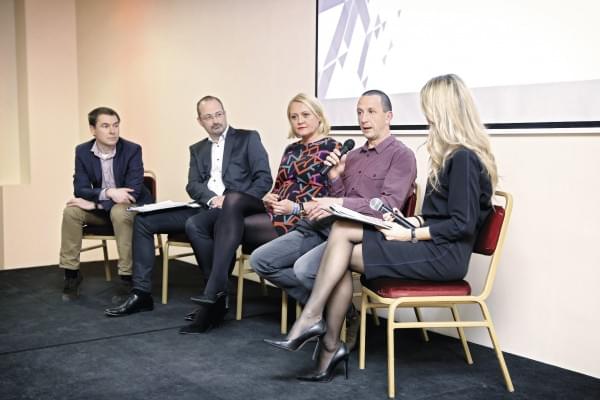Magazine: E-commerce up-close
There were nearly 1,500 participants and more than 40 exhibitors at the very first eCommerce Expo, held on 24 March in Budapest. The event’s main sponsor was Shoprenter and participants could listen to presentations in five sections: launching an online shop & home business, marketing & acquiring customers, conversion & loyalty, global & offline, growth & automation. Work started with the presentation of Attila Horváth, associate professor of the Budapest Metropolitan University, who spoke about the roles in which online shop operators have to do well, being many things from content marketing manager to web designer.
A roundtable discussion followed, with the participation of Erik Csupor from Moto24, CEU professor György Bőgel and Bónusz Brigád owner and founder Gábor Heller, who were talking about the future of e-commerce. Participants agreed that in the future online stores won’t be like they are today, as only those online shops will stay alive which offer services simply and quickly, earning the trust of consumers. Mr Csupor opined that today smart shoppers play the main role in what we can call smart commerce. Mr Heller shared his view that e-commerce has become a part of everyday life to the extent that in the future there will be no point in differentiating it from offline retail – the border between the two is already blurred today. Mr Bőgel told: when we talk about the future of online shops, the key thing is security. Participants concluded that web shops launched today should be specialists of something and offer a true shopping experience.
Matt Komorowski, Paypal’s head of sales in Central and Eastern Europe was also present at the eCommerce Expo. He spoke about global retail opportunities and revealed that according to a survey conducted by Paypal, 50 percent of customers shop in international online stores because of the free delivery of many products and because payment is safe. The sales director told they had launched the Paypal One Touch service in Hungary this year.
Zoltán Ormós, the owner of OrmósNet Law Firm that specialises in online law and president of the Electronic Retail Association, spoke about how online shop operators can avoid having to pay fines. Up until a sales revenue of HUF 100 million the maximum fine that can be imposed by the consumer protection authority is HUF 500,000 (above a sales revenue of HUF 100 million the fine can be 5 percent of the revenue, but maximum HUF 100 million). Last October the data protection fine was increased to HUF 20 million.
Mária Törőcsik, a researcher from the University of Pécs told that it isn’t low prices with which online stores attract shoppers today, people now enjoy the process of shopping online the same way as in a mall. Shoppers are now smart and critical, with lots of expectations. Visuality is very important to them: they refuse to read long texts, they want data in the form of infographics. Ghostmonitor co-founder Soma Tóth revealed that according to data from Business Insider, the proportion of abandoned carts is 70-75 percent in online shopping. One of the reasons behind this is that by using price comparison websites online shoppers can quickly find better offers. Ghostmonitor has found that in many cases shoppers registered on a website but left without buying anything. When they were called later they told that small problems made them leave. After the company solved these 50 percent of customers purchased the product they had originally intended to buy.
At the end of the day there was a roundtable discussion about the synergies between online and offline channels of retail. Mónika Herr, head of marketing with Deichmann told that they launched their online shop in 2014 in Hungary. Sales are much better than in the online shops of Western European countries. WhiskyNet founder Zsolt Szigeti revealed that they only opened a physical store in 2007 because customers demanded it. Reflexshop owner Attila Ádám launched the online wholesale business of creative products when it was still mandatory to have an offline unit too. G-Roby director Sándor Nagy told that their customers tend to do their big monthly or weekly shopping online and buy the few goods they need every day offline. (x)
Related news
Related news
They want it to be premium, but also sustainable – expectations of the youngest generation
GlobalData’s latest report, “Demographics in Retail and Apparel” – which…
Read more >Zsolt Liptai became the winemaker of the year
The Hungarian Wine Academy (MBA) has awarded Zsolt Liptai, the…
Read more >Tips for avoiding credit card fraud during the holiday season
The Christmas season is all about the joy of shopping,…
Read more >





